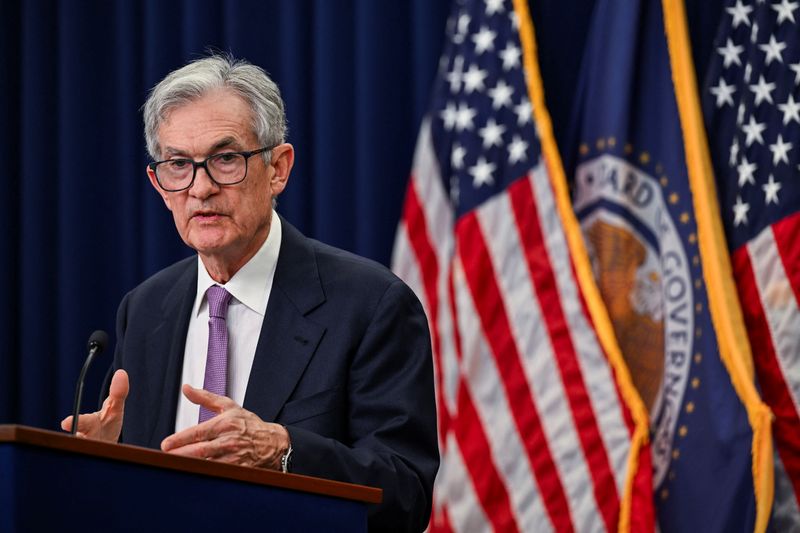Morning Bid: Powell tees up after S.Korea jars, France waits
2024.12.04 06:35
A look at the day ahead in U.S. and global markets from Mike Dolan
A bizarre 24-hour period in which the world’s 12th-biggest economy briefly introduced martial law left markets pondering geopolitical risks next year while awaiting a casting vote, or at least a steer, on whether the Federal Reserve eases this month.
As the French government faces a confidence vote in parliament on Wednesday, politics of a different sort took hold in South Korea yesterday – jarring local markets and briefly nudging safety trades in U.S. Treasuries and the dollar.
President Yoon Suk Yeol said on Wednesday he would lift the martial law declaration he had imposed to universal shock hours before, backing down in a standoff with parliament, which rejected his move and then set about impeaching him.
The won bounced back from two-year lows as the decree was reversed, recovering most of Tuesday’s 2.5% plunge, but Seoul’s benchmark ended 1.4% lower today. The country’s finance officials said all efforts to support markets would be used and currency intervention was likely used.
While Yoon backed down, his move against what he described as “anti-state forces” will unnerve those who fear a shift in geopolitical calculus more broadly as Donald Trump’s new administration takes office in January.
Although Yoon did not cite any specific threat from North Korea, instead focusing on his domestic political opponents, it was the first time martial law had been declared in South Korea since 1980.
In Europe, French Prime Minister Michel Barnier’s inability to secure a compromise on his cost-saving 2025 budget could see the first French government forced out by a no-confidence vote in more than 60 years. The debate starts about 1500 GMT (1000 ET) and is due to last about four hours.
Markets were relatively calm ahead of the vote, with the French-German government debt spread compressing to 82 basis points as nominal yields in both backed up a bit. France’s benchmark stock index was slightly higher on the day and the euro was steady against a firm dollar.
Back stateside, the market spotlight turns to Fed Chair Jerome Powell – who’s interviewed by the New York Times (NYSE:) later in the day.
In a big week for U.S. labor market updates, Fed policymakers speaking so far this week have been equivocal about their support for another interest rate cut on Dec. 18.
Futures have moved this week to price a more than 70% chance of a quarter-point cut this month and Powell – who will also be pondering his own role under a new Trump administration – may give a clearer picture on what the central bank sees.
Treasury yields crept back up after the first of the week’s U.S. employment reports.
While job openings increased more than forecast in October and layoffs ebbed, the Job Openings and Labor Turnover Survey – or JOLTS report – also showed employers hesitant to hire more workers.
ADP’s November private sector payrolls numbers are due for release later alongside key service sector surveys, and everything leads up to the national employment report on Friday.
A Reuters survey of economists estimated payrolls increased by 200,000 jobs last month after rising by only 12,000 in October, the fewest since December 2020. The unemployment rate is forecast to tick up to 4.2% from 4.1% in October.
The was slightly higher on the back of firmer Treasury yields and overseas political jitters and Wall Street stock futures were also up ahead of the bell after a flat Tuesday near record highs.
Shares in Salesforce (NYSE:) rose more than 10% in pre-market trade after its overnight earnings beat and robust revenue forecast.
Elsewhere, China’s stocks fell again after a disappointing services sector survey for last month and as the latest salvoes in investment curbs with the United States.
With Trump tariff rises looming, Beijing banned exports to the United States of critical minerals that have widespread military applications, a day after Washington’s latest crackdown on China’s chip sector.
Four of China’s top industry associations said Chinese companies should be wary of buying U.S. chips as they are “no longer safe” and buy locally instead.
The steadied after hitting 2024 lows on Tuesday.
Key developments that should provide more direction to U.S. markets later on Wednesday:
* US November private sector payrolls from ADP, November service sector surveys from ISM and S&P Global, October factory goods orders; Brazil Oct industry output; Canada Q3 productivity
* Federal Reserve Chair Jerome Powell, St. Louis Fed President Alberto Musalem and Richmond Fed chief Thomas Barkin all speak; European Central Bank President Christine Lagarde speaks

* Fed publishes Beige Book on economic conditions
* US corporate earnings: Synopsys (NASDAQ:), Dollar Tree (NASDAQ:), Campbell’s, Hormel Foods (NYSE:)
(By Mike Dolan,; mike.dolan@thomsonreuters.com)








